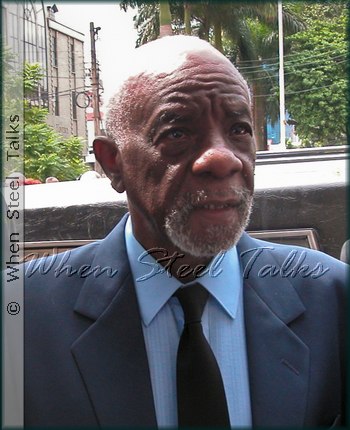Bertram Lloyd Marshall (born February 6, 1936 in, Laventille, Port-of-Spain, Trinidad - died, October 17, 2012)
Bertie was born in 1936 in the working class community of Laventille at a time when Trinidad was in industrial turmoil and the transition from Tamboo Bamboo to Dustbin was in full gear. By the end of World War Two (WWII) notes appeared on the drums and Bertie, as a schoolboy, experienced and witnessed this transition as there were several steelbands in his and the surrounding communities. These experiences impacted greatly on the young Bertie Marshall as evidenced by his lifelong commitment to the development of this indigenous musical instrument.
He became the leader of Highlanders Steel Orchestra, a legendary steelband from his community that excelled in: tonal quality; repertoire; playing techniques and performances. Thousands of people, mainly youths, played Mas with Highlanders on Carnival days. The band was also famous for their renditions of classical music at the J’Ouvert Bomb Competitions. Highlanders, led by Bertie, was a community institution that attracted youths who were engaged in the practice and performance of music, advanced playing techniques (using three or four-sticks) and tuning.

The late steelpan innovator and pioneer
Bertie Marshall
Bertie Marshall is often described as a perfectionist who challenged tradition while seeking excellence in tonal quality and music. Without formal training, he ventured into the fields of: Science of Sound; Acoustical and Sound Engineering. Using the limited resources at his disposal and driven by a passion for perfection, he introduced, developed and mastered Harmonic Tuning in steelband instrumentation. Bertie created the Double Tenor which can now be found in steelbands all across the world. He also designed and produced the Bertphone an avant-garde steelband instrument that addressed resonance of notes. It was Highlanders that introduced amplified pans in the steelband on the road, long before brass bands. Highlanders also introduced canopies covering the pan racks to protect the instruments from the effects of the sun and rain.
Bertie was a Musical Arranger for his band, preparing music for the full orchestra or an ensemble and playing a repertoire of Classical; Contemporary; Calypso; Latin and Religious music. Highlanders was one of the first steelbands to perform in church in concert at the Trinity Cathedral with its full choir and pipe organ. He was also a Virtuoso Player on Tenor where he would improvise during live performances and recordings.
Among other things, Bertie Marshall was a Teacher/Educator. Alvin Romain, Tony Slater, Clifford Alfred and Vincent “Taboo” Taylor all became full-time professional Tuners; they were all members of Highlanders and were exposed to their craft by Bertie himself. He was, later on, a Lecturer at the Advanced Pan Tuning Programme at the University of Trinidad and Tobago (UTT) where he taught groups of young Tuners to become Master Tuners.
He served as advisor to many people in the steelband movement: Leaders; Tuners; Arrangers; Players and Administrators, all of whom benefitted from his wealth of experience and knowledge whenever he was approached. Bertie was also a community-minded person, those who lived close to him speak of his generosity to parents, children and others, and he was always there for them.
Additional info below posted with special permission from the BestOfTrinidad.com by Ronald C. Emrit - check link for potential updates
| DATE OF BIRTH: | February 6, 1936 |
| PLACE OF BIRTH: | Laventille, Trinidad |
| EDUCATION: |
|
| STEELBANDS: |
|
| SPECIALTIES: |
|
| CAREER: Marshall began his steelband career in the 1950s playing at the Chaguaramas Naval Base with a stage steelband called "The Armed Forces," aptly named named after its audience of US servicemen. The Armed Forces eventually changed its name to Highlanders after uniting with the Mas' Band of the same name led by Kimloy Wong. The Highlanders began practicing on Erica Street in Laventille and later moved to Mango Rose Trace, Laventille. By the early 1960s, Marshall had developed a new lead instrument, the double-tenor, for Highlanders where he was the leader, tuner, and arranger. He went on to become the first panman to install covers over pans during Carnival when he observed that the heat generated by the rays of the sun raised the temperature of the playing surfaces of pans and affected their tone. His continued experimentation with electronics resulted in his 1964 introduction of amplified pans which were used for the first time on the road during the 1965 Carnival. In 1971, he introduced the Bertphone, a foot pedal system for controlling the tone of amplified pans. Highlanders were disbanded in 1972 and Marshall joined Desperadoes as a tuner, following an invitation from its leader, Rudolph Charles. In 2004, Marshall suffered a stroke that paralyzed the left side of his body and greatly curtailed his pan-tuning work. | |
AWARD:
|
|
| DIED | October 17, 2012, after a long bout with diabetes. |
| Compiled by Ronald C. Emrit | |



 Bertie Marshall - The Steel Pan
Visionary - by Dalton Narine
Bertie Marshall - The Steel Pan
Visionary - by Dalton Narine
